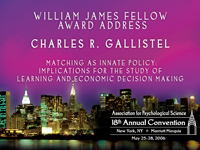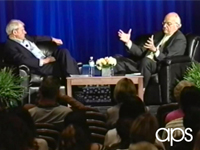A History of Our Future: APS’s Student Caucus
In the summer of 1988, Kathleen Chwalisz, then a graduate student at the University of Iowa, attended a pajama party in Bonnie Stickland’s suite at the APA Convention. (In response to the smokers attended by the male leaders of the field, the grandes dames of psychology threw “jammy parties” for themselves and their proteges.) The talk of this particular party was the recent formation of APS and, as the women discussed the new organization, Chwalisz suggested that a student group should be a part of it. After several of her peers responded positively to the idea, she agreed to organize the new group.
Chwalisz contacted the graduate students who had joined APS, 14 of them met at the first APS Convention, and those 14 decided to form the APS Student Caucus (APSSC), a group devoted to serving the needs of psychology students by providing them with the skills and opportunities necessary to excel in the field. Today, the original membership of 14 has grown to include over 3,700 students.
As APS Executive Director Alan Kraut remembers, the inception of a student caucus was entirely the brainchild of the students. It was unusual for professional societies to have student groups at the time, but when they approached the APS Board with the idea, Board members quickly realized that student involvement should be an integral part of the Society. As Kraut explains, “the notion that students are the future of APS has been important from the first Board of Directors to the current Board.”
To foster the growth of this new group, APS hosted yearly retreat meetings for the students. For a period in the 1990s, these meetings took place in Washington, DC, and often included a dinner for the Executive Board at the Kraut residence. Kraut remembers one such dinner particularly well. All of the students had, of course, been on their best behavior during dinner with Dr. Kraut, but toward the end of the meal one student relaxed enough to put his elbows on the table. A large fissure spread through the thick marble tabletop and about a third of the table’s 10-foot length collapsed into the laps of several helpless students. The rest of the dinner party swiftly rescued them while Kraut’s wife attempted to calm the frightened students by assuring them, “Oh, this happens all the time.”
Today, APSSC carries on its mission through the many programs it offers to students, including the Student Research Award. Each year, up to four awardees are invited to present their research in an address at the Convention. And in 1994 the APSSC formed a new committee, RiSE-UP (Research on Socially and Economically Underrepresented Populations), dedicated to encouraging research on traditionally underrepresented populations. Each year the RiSE-UP committee recognizes up to four students who are invited to present in a symposium at the APS Convention.
APSSC also encourages new research through the Student Research Grant. Each year, APSSC members are invited to submit proposals for grants awarded to both graduate ($500) and undergraduate ($300) students. All of the reviewing for the Student Research Award, the RiSE-UP Research Award, and the Student Research Grant is done by student volunteers, providing the students with valuable experience evaluating psychological research.
In the late 1990s the APSSC Executive Board worked to develop the Mentorship Program, matching graduate students with undergraduates to provide friendly voices as the younger students navigate the transition to further education and a career. In an effort to reach out to new members and provide even more opportunities for student involvement and leadership, APSSC recently implemented the Campus Representatives Program, giving one student on every campus the chance to develop APSSC’s presence at each school. So, far more than 200 campus reps have joined the program.
Since its inception, one of APSSC’s key goals has been giving students the chance to meet and network with other psychology students in an informal, welcoming atmosphere. At each annual convention, APSSC plans numerous events for student members, including the annual convention kick-off event and student social. APSSC also runs travel assistance and room matching programs to help students defray the cost of attending the convention. Soon after joining, past APSSC President Jennifer Thorpe realized that “working with APSSC has bonded [her and her fellow students] together in a very unique way – more than giving us the chance to get to know our colleagues, it has created friendships that will undoubtedly last our careers.”
Beyond giving students the opportunity to meet each other, APSSC also gives students a chance to meet the brightest minds in the field. The annual convention includes formal opportunities to meet senior psychologists, such as the “Tea with Champions” event, but also casual opportunities for mingling. John Newman, now at Kutztown University of Pennsylvania and one of the original 14 APSSC members, remembers that the “intimate structure of poster presentations and the renegade spirit of the first few years” lead to him discussing not only his research, but also shared family history with Uri Bronfenbrenner at the 1989 Convention (both their fathers were Army psychiatrists). At another convention, his experience working security in college allowed him to advise Beth Loftus about how to handle a heckler. Their correspondence continues to this day.
As important as physical networking is, the most crucial benefit of the APSSC may be the confidence that it imparts to the student members. Former APS officer Susan Perry, now at Case Western Reserve University, was given her “first real exposure to psychological scientists and other psychology students” when she attended the Fifth Annual APS Convention in Chicago and “gained experience in presenting research, peer review of research, and leadership” during her time with APSSC. As part of her APSSC presidential duties, Jennifer Thorpe participated in last years APS Board of Directors meeting. She felt that at the meeting “her ideas were completely respected and that the Board was genuinely interested in considering the needs of students.” John Newman also experienced this, saying “Most importantly for me, APSSC provided confidence that I could have a voice in the organization.” Like so many other APSSC members, that confidence parlayed into a successful psychological career.




APS regularly opens certain online articles for discussion on our website. Effective February 2021, you must be a logged-in APS member to post comments. By posting a comment, you agree to our Community Guidelines and the display of your profile information, including your name and affiliation. Any opinions, findings, conclusions, or recommendations present in article comments are those of the writers and do not necessarily reflect the views of APS or the article’s author. For more information, please see our Community Guidelines.
Please login with your APS account to comment.